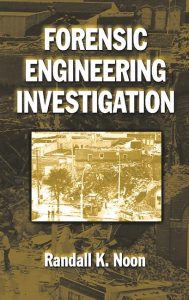
The term forensic when heard always adds a drama to common men’s minds. Thanks to those rip-roaring Hollywood movies for which forensic has become synonymous with:
- Murder mystery
- Luck
- Tried and make-believe attempts
- Unprecedented powers of reasoning the off beam
However, forensic and its discipline rarely bear any resemblance with the treatment of this field in Hollywood. The spectrum of forensic engineering is vast and typically includes the investigatory elements of- materials, products, & several components that do not operate as intended.
Every year, a good section of students aspires to be a forensic engineer. But, many are not able to envision their dreams. We believe the primary barriers that aspirants usually encounter are as follows:
- Dearth of knowledge
- Guidance
- Cost
Understanding the predicament, this unit discusses forensic engineering which is growing exponentially to serve the mass.
Basics of this Department
According to the definition given by the National Academy of Forensic Engineers, the discipline is all about the application of science and art in the right proportion in relation to the jurisprudence system. Considering the end goal, the trade focuses on reverse engineering to reckon the causes of any product failure.
By products, we mean- inferno, auxiliary breakdown, a breach in security framework, nefarious acts, the ruination of hardware, and a lot more.
The main duties of any professional forensic engineer are as follows:
- Collection data and evidence
- Developing models to solve the case
- Performing tests using state-of-the-art techniques
- Obtaining similar products
The tasks mentioned above are the essential strides to conduct any forensic investigation.
Challenges in this Field
Every profession has its own share of challenges and forensic engineering is no exception. Individuals who aspire to stay in this profession should have sturdy mental stability to face unwanted and unpleasant situations during their duty hours. This is because no forensic case is always quite the same.
Each case has unique obstacles. Usually, with the failure of any component or material, engineers uncover causes that they have not encountered earlier. May sound apparently stiff, but this is the most stimulating part of the job.
However, the challenges can be resolved with ease if a professional has rock-solid grit and wit. With a proper planning and meticulous approach, one needs to treat all potential evidence to draw a conclusion. And to do the deed, the engineers must have substantial experience in litigated matters.
We always recommend the aspirants to choose an authorized institution to study the discipline with hands-on training. The more learned they become during these formative years, the more skilled they will be.

Learning Outcomes
The growth area in forensic engineering is quite promising due to the increasing levels of quality. The best of the best candidates are only able to make a mark in this trade. So, after gaining a degree in this discipline, individuals can explore the following arenas:
- Recognition of safety-critical components in several products
- Using of conceptual principles like fault-tree analysis diagrams for deciphering different modes of failures
- Analyzing the cause of product failure
- Obtaining information from codes of practice, specifications or even technical literature to move ahead with the process.
All these points are in fact different job roles that candidates are given after becoming a forensic engineer.

Eligibility Criteria
To become a forensic engineer, people need to qualify a few criteria.
- A 4-years bachelor degree in forensic engineering
- Obtaining a license by passing the Principles and Practices of Engineering exam
- Hands-on experience from a reputable agency
- Procurement of a certification after successful completion of the training period
The entire process is quite a bit lengthy and may take up to 6 years. Engineers are trained extensively during this tenure as the job has no room for any errors.
Bottom Line
Advancements in this career can be achieved with hard work and proper education. For more information, the aspiring candidates can feel free to contact us! We are happy to serve.